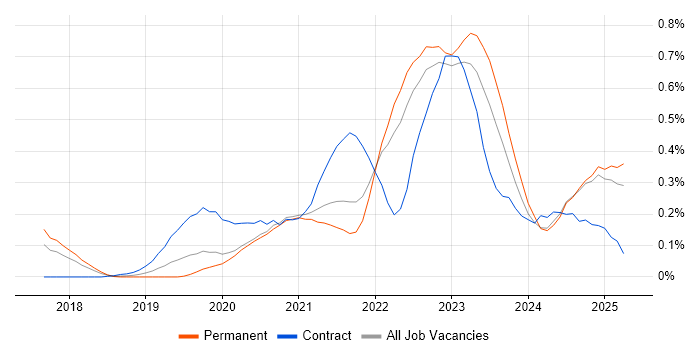Azure Functions
England > Yorkshire
The table below provides summary statistics and salary benchmarking for jobs advertised in Yorkshire requiring Azure Functions skills. It covers permanent job vacancies from the 6 months leading up to 11 January 2026, with comparisons to the same periods in the previous two years.
| 6 months to 11 Jan 2026 |
Same period 2025 | Same period 2024 | |
|---|---|---|---|
| Rank | 163 | 134 | 172 |
| Rank change year-on-year | -29 | +38 | +66 |
| Permanent jobs citing Azure Functions | 1 | 15 | 1 |
| As % of all permanent jobs in Yorkshire | 0.030% | 0.48% | 0.030% |
| As % of the Cloud Services category | 0.090% | 1.41% | 0.072% |
| Number of salaries quoted | 1 | 15 | 0 |
| Median annual salary (50th Percentile) | £60,000 | £50,000 | - |
| Median % change year-on-year | +20.00% | - | - |
| England median annual salary | £70,000 | £62,500 | £65,000 |
| % change year-on-year | +12.00% | -3.85% | - |
All Cloud Computing Skills
Yorkshire
Azure Functions falls under the Cloud Services category. For comparison with the information above, the following table provides summary statistics for all permanent job vacancies requiring cloud computing skills in Yorkshire.
| Permanent vacancies with a requirement for cloud computing skills | 1,111 | 1,063 | 1,389 |
| As % of all permanent jobs advertised in Yorkshire | 33.30% | 33.88% | 41.64% |
| Number of salaries quoted | 662 | 577 | 1,173 |
| 10th Percentile | £28,000 | £30,500 | £29,000 |
| 25th Percentile | £30,625 | £41,250 | £40,000 |
| Median annual salary (50th Percentile) | £49,500 | £52,500 | £53,500 |
| Median % change year-on-year | -5.71% | -1.87% | -2.73% |
| 75th Percentile | £73,438 | £69,750 | £71,250 |
| 90th Percentile | £85,000 | £85,000 | £84,056 |
| England median annual salary | £60,000 | £65,000 | £60,000 |
| % change year-on-year | -7.69% | +8.33% | -7.69% |
Azure Functions
Job Vacancy Trend in Yorkshire
Historical trend showing the proportion of permanent IT job postings citing Azure Functions relative to all permanent IT jobs advertised in Yorkshire.

Azure Functions
Salary Trend in Yorkshire
Salary distribution trend for jobs in Yorkshire citing Azure Functions.

Azure Functions
Job Locations in Yorkshire
The table below looks at the demand and provides a guide to the median salaries quoted in IT jobs citing Azure Functions within the Yorkshire region over the 6 months to 11 January 2026. The 'Rank Change' column provides an indication of the change in demand within each location based on the same 6 month period last year.
| Location | Rank Change on Same Period Last Year |
Matching Permanent IT Job Ads |
Median Salary Past 6 Months |
Median Salary % Change on Same Period Last Year |
Live Jobs |
|---|---|---|---|---|---|
| West Yorkshire | -34 | 1 | £60,000 | +20.00% | 1 |
| Azure Functions England |
|||||
Azure Functions
Co-Occurring Skills & Capabilities in Yorkshire by Category
The following tables expand on the one above by listing co-occurrences grouped by category. They cover the same employment type, locality and period, with up to 20 co-occurrences shown in each category:
|
|
|||||||||||||||||||||||||||||||||
|
|
|||||||||||||||||||||||||||||||||
|
|
|||||||||||||||||||||||||||||||||
|
||||||||||||||||||||||||||||||||||
